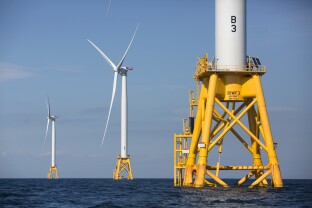The Trump administration is pushing the conventions of environmental permitting processes to kill energy projects it doesn’t like, and so far the courts are giving the president an opening to do it.
A federal judge ruled last week that the Bureau of Ocean Energy Management can reconsider the construction and operations plan for SouthCoast Wind, an offshore wind project off the coast of Rhode Island that had been approved under the Biden administration.
Reconsidering — and then potentially revoking — the permit is within BOEM’s rights given Trump’s January directive “requiring a second look at all wind energy projects,” Judge Tanya S. Chutkan’s opinion said.
The opinion is prompting concerns from environmental experts and developers about the diminishing weight of previous agency decisions, as the Trump administration takes unprecedented steps to undo them.
“Now these permits don’t even seem to be worth the paper that they’re written on, so to speak,” Kris Ohleth, the director of the Special Initiative on Offshore Wind, told NOTUS. “So there’s no longer the confidence of the development community to continue projects when the permits that they’ve paid so much money for and spent years seeking are being overturned.”
Chutkan’s ruling requires BOEM to rereview the permits for the project, meaning the agency cannot use the court’s decision as a green light to immediately revoke SouthCoast Wind’s approvals.
The administration’s publicly hostile position on wind energy means a rereview could be a gateway to ending the offshore wind project altogether, environmental and energy lawyers told NOTUS.
“It’s part of the administration’s disfavoring of wind,” one former federal government lawyer who worked on environmental litigation in multiple agencies under several administrations told NOTUS. “Technically, this lawsuit and reconsideration is only about this one project, but you would be a fool if you were in charge of another project, then you didn’t see this as a sign of the administration’s desire to stop wind.”
Chutkan’s ruling is the latest win for the Trump administration in its quest to twist Biden-era litigation into a pathway to quell offshore wind development by siding with environmental and community groups that argued against the previous administration’s wind approvals.
The court’s opinion also comes as the federal government has made similar moves to reconsider permits through other pending offshore wind litigation, suggesting BOEM could see favorable rulings from the courts in those cases too.
BOEM requested earlier this year that the court allow it to revoke the construction and operations plan for the Maryland Offshore Wind project, which is set to be operational next year. Another filing in a separate case signals the agency wants to undo the same approval for the New England Wind project.
The ruling “is part of a pattern” and “a desire to use this playbook on as many of the wind projects as they can, or to use some kind of similar means of hurting them,” the former federal government lawyer told NOTUS.
Earlier court filings by BOEM said the agency wants to take a second look at SouthCoast Wind because earlier reviews may have “understated or obfuscated impacts” of the wind farm.
But the agency will likely take its “distaste for offshore wind” into account alongside typical environmental review methods, Robin Kundis Craig, a professor at the University of Kansas Law School and an expert on offshore wind and water rights, said — setting off a legal battle over whether that’s enough of a reason to undo permits that were already granted.
Chutkan’s ruling allows SouthCoast Wind to challenge the BOEM’s final decision.
BOEM did not respond to multiple requests for comment about what its rereview of SouthCoast Wind would entail.
SouthCoast Wind CEO Michael Brown said in a statement to NOTUS that the developer is “currently assessing the implications of the decision and will consider all appropriate next steps, including the pursuit of legal remedies, to ensure the project’s integrity and its long-term contribution to regional and national energy goals.”
“These are permits that we’ve already gone through the leasing, they’ve gone through the bidding, they’ve gone through a purchase of the lease, they’ve gone through the permitting process,” Craig said. “To what extent all of that can be unwound is, in my mind, an open legal question.”
She expects similar rulings in the other cases where BOEM is looking for a remand.
It hasn’t been all losses for wind developers in the courts. Offshore wind developers saw a win when a judge ruled last month that the Trump administration’s decision to place a stop-work order on Revolution Wind was unlawful.
But those wins haven’t undone the “dark cloud of uncertainty” hanging over the offshore wind industry, said Michael Gerrard, an environmental lawyer and the founder of the Sabin Center for Climate Change Law at Columbia University.
That cloud could also extend beyond offshore wind. The oil and gas industries should be concerned about the administration’s attempt to undo existing permits because future presidents could flip the script to stymie fossil fuels, Ohleth said.
“It’s really no way to build an industry or infrastructure writ large in our country, because this really can reverberate into other sectors as well,” Ohleth said. “If major infrastructure is all at the whim of someone at the top of government, it just really is bad economic practice.”
Sign in
Log into your free account with your email. Don’t have one?
Check your email for a one-time code.
We sent a 4-digit code to . Enter the pin to confirm your account.
New code will be available in 1:00
Let’s try this again.
We encountered an error with the passcode sent to . Please reenter your email.


